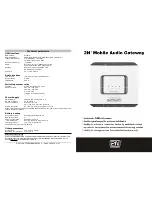
63
Software 09
PC-Control
The freeware ARCP-890 is available as a radio control program dedicated to the TS-890S, and the PC command
reference guide is openly available, and we suggest trying a self-programmed application for your own purpose.
The following are the descriptions for a self-programmed application and some instructions and tips for the PC
commands
● Descriptions for Programming the PC Application
To make an application using the PC commands, the COM serial communication is generally used after connecting the
transceiver and a PC with an RS-232C cable or a USB cable. To make a serial communication, the serial port class,
etc. (depends on the programming language used) is used for the PC application. The basic contents to program are as
follows:
• Opening a serial port (COM port)
• Configuring the communication parameters such as the baud rate and the number of bits
(Refer to page 1 of the PC command
reference guide for the communication parameter configuration.)
• Writing the transmission data to the transmission buffer of the serial port
• Reading the reception data from the reception buffer of the serial port
• Closing (disconnecting) the serial port
● Program for Sending Commands
To send a command to the transceiver, the command to send needs to be written one byte at a time to the transmission
buffer of the serial port. Refer to the PC command reference guide for the commands. A semicolon (;) is always needed
at the termination of the command.
If the configured command is sent properly, the transceiver status changes. If the read command is sent properly, the
response command is returned from the transceiver
● Program for Receiving Commands
To receive a command by the transceiver, the buffer for reading a command needs to be prepared to read the data to the
buffer one byte at a time from the reception buffer of the serial port. If the read data has a semicolon (;), the reception of
the command completes, and the received content will be analyzed.
● Configuring and Reading the VFO Frequency
To configure and read the VFO A frequency, the FA command is used. To configure and read the VFO B frequency, the
FB command is used.
● Distinguishing between the Receive VFO and the Transmit VFO, Distinguishing between
Simplex and Split
By using the read command of the FR command and FT command, you can distinguish which of VFO A and VFO B is
the receive frequency and which is the transmit frequency.
To know which VFO is the receive frequency, send “FR;” from the PC application. If “FR0;” is returned from the
transceiver, VFO A is the receive frequency. If “FR1;” is returned, VFO B is the receive frequency.
To know which VFO is the transmit frequency, send “FT;” from the PC application. If “FT0;” is returned from the
transceiver, VFO A is the transmit frequency. If “FT1;” is returned, VFO B is the transmit frequency.
If the numbers of the parameters of the FR command and FT command returned from the transceiver are the same,
that means the transceiver is in the simplex operation, and if they are different, that means the transceiver is in the split
operation.
By using the configured commands of the FR command and FT command, the same operation as using the [A/B] key
and
[SPLIT]
key can be remotely controlled from the PC application with the combination of the commands.
















































